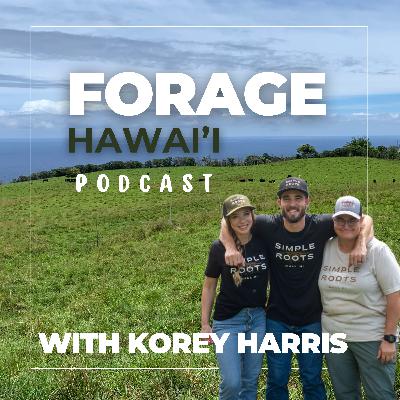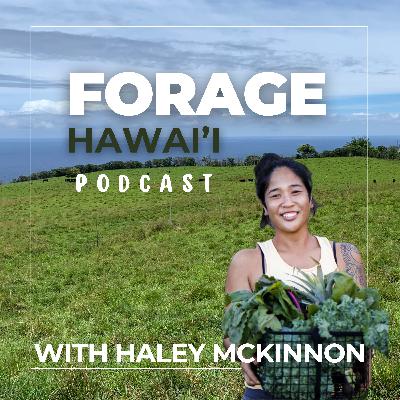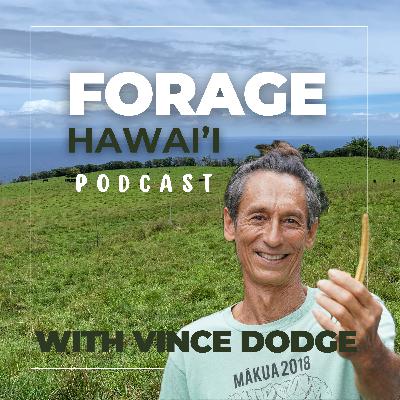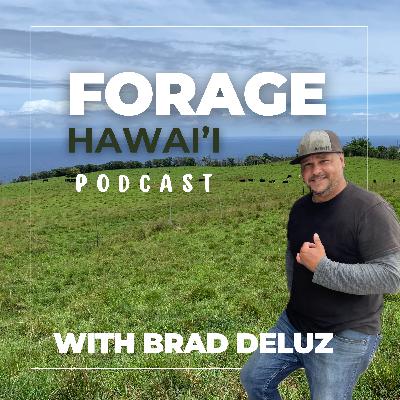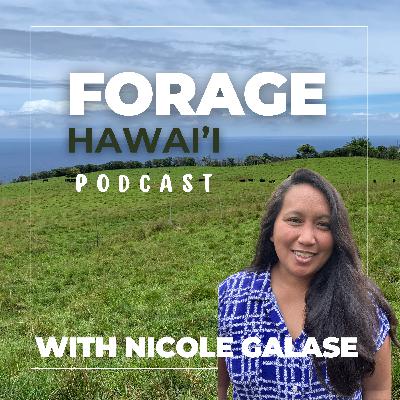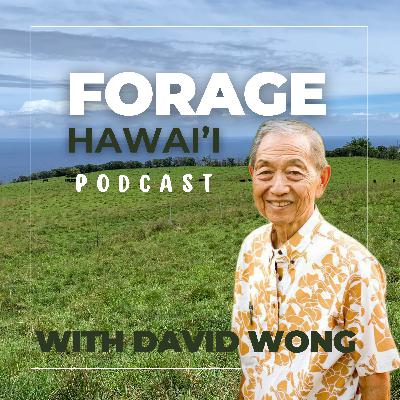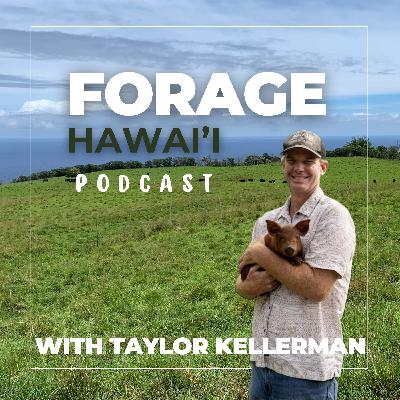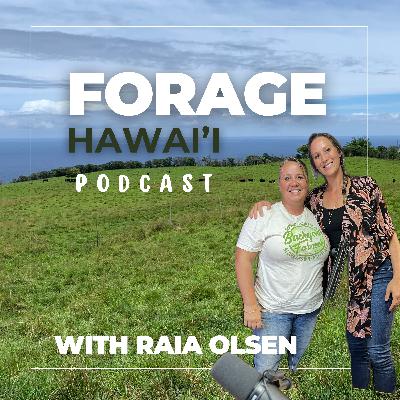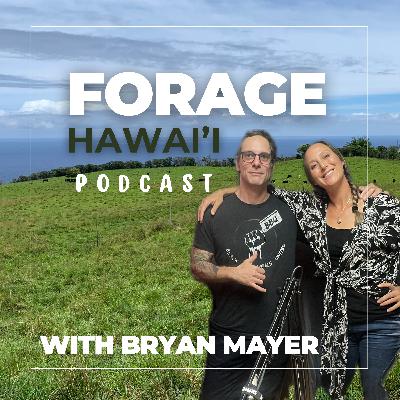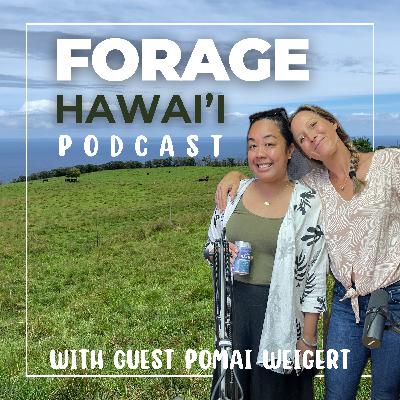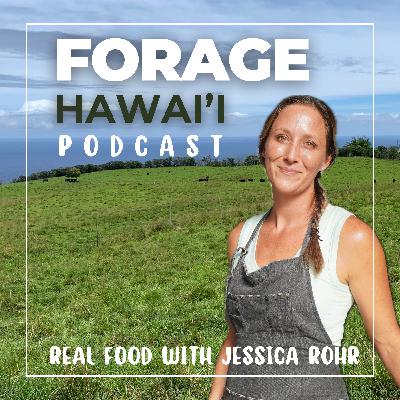Discover Forage Hawaii Podcast
Forage Hawaii Podcast

Forage Hawaii Podcast
Author: Jessica Rohr
Subscribed: 1Played: 7Subscribe
Share
© Jessica Rohr
Description
The Forage Hawaii Podcast connects consumers to the stories of our local agriculture and food system. Hosted by Jessica Rohr, owner of Forage Hawaii, a local meat purveyor located in Honolulu.
Jessica connects you with the life behind our ranchers, farmers, and other valued leaders in Hawaii's food space. We ask hard questions, get personal, and hopefully teach you something you didn't know about how our food is raised, grown, and processed.
Jessica connects you with the life behind our ranchers, farmers, and other valued leaders in Hawaii's food space. We ask hard questions, get personal, and hopefully teach you something you didn't know about how our food is raised, grown, and processed.
14 Episodes
Reverse
Join us as we dive into the inspiring journey of Korey Harris, who transitioned from a police officer to a full-time farmer on Maui. Discover the challenges and triumphs of running Simple Roots Farm, from navigating the complexities of sustainable farming to balancing family life. Korey shares insights into the realities of farming in Hawaii, the importance of community support, and the passion that drives him and his family to cultivate a thriving farm. Tune in for an engaging conversation about resilience, innovation, and the heart of farming.
takeawaysHaley and Matthew co-own Ahiki Acres, a diversified farm in Waimanalo.Haley's journey into farming was influenced by her experiences with food security in Hawaii.The importance of family support in starting and running a farm.GoFarm Hawaii provides essential training for beginner farmers.Organic farming has misconceptions that need to be addressed.Soil health is crucial for sustainable farming practices.Farming in Hawaii presents unique challenges, including land access and climate issues.Local food systems are vital for community health and sustainability.Financial challenges are a significant barrier for small farmers.In this episode of the Forge Hawaii podcast, host Jessica Rohr interviews Haley McKinnon, co-owner of Ahiki Acres, a diversified farm in Waimanalo. They discuss Haley's journey from chemical engineering to farming, the importance of food security in Hawaii, and the challenges faced by small farmers. The conversation highlights the role of family support, the misconceptions surrounding organic farming, and the significance of soil health. Haley shares her vision for community engagement and the future of her farm, emphasizing the need for sustainable practices and local food systems.
In this conversation, Jessica Rohr and Vince Dodge discuss the use of kiawe (mesquite) as a food source. Uncle Vince dries, mills, and creates edible 'Aina bars and flour out of the pods of the abundant Kiawe Trees found in huge quanties on the West side of O'ahu, through his company Wai'anae Gold. You can find his products at various stores and food hubs including Kahumana and Farm Link.
They talk about how kiawe flour can be used in various recipes. They also discuss the history of kiawe as a feed for animals and its potential as a diabetic-friendly food. Vince shares his personal journey from fishing, working with youth and traveling to Argentina to learn from the Wichi people, who use kiawe as a staple food. The conversation highlights the importance of connecting with the land and the ocean and the role of food in shaping culture and community.
This conversation emphasizes the value of gathering beans by hand and the relationship-building aspect of the process. It also challenges the notion of kiawe as an invasive species and highlights its medicinal properties and resilience in the face of climate change.
https://www.honolulumagazine.com/waianae-gold-kiawe-flour/
https://shop.kahumana.org/product/waianae-gold-aina-bar
https://farmlinkhawaii.com/product/waianae-gold-kiawe-bean-pod-flour
https://www.civilbeat.org/2021/07/how-one-hawaii-man-is-using-an-invasive-tree-to-nurture-his-community/
In this conversation, Jess interviews Brad DeLuz, owner of Hamakua Meat Processors, about his role in processing meat for local farmers and ranchers on the Big Island of Hawaii. They discuss the challenges and rewards of working in the meat processing industry, the history of beef supply in Hawaii, the sourcing and quality of the meat, and the importance of food safety and regulations. Brad also shares insights into the day-to-day operations of his processing facility.
Nicole Galase, the managing director of Hawaii Cattlemen's Council, discusses the work of the Hawaii Cattlemen's Council and the Hawaii Rangeland Stewardship Foundation in promoting and supporting the cattle industry in Hawaii. She emphasizes the importance of collaboration and outreach to tell the story of the cattle industry and address negative perceptions. Nicole also highlights the generational commitment and cultural significance of ranching in Hawaii. She addresses the contrast between reforestation efforts and properly raised holistic grazing, emphasizing the need for a balanced approach that supports both food production and conservation. Nicole challenges the notion that cattle are inherently bad for the environment, explaining the natural cycle of methane emissions and the role of well-managed rangelands in sequestering carbon. She also discusses the challenges faced by ranchers in preserving agricultural lands and the need for a comprehensive plan that considers the goals and needs of Hawaii. The conversation explores the misconceptions surrounding the environmental impact of cattle ranching and the benefits of well-managed range lands. It highlights the need for a paradigm shift in understanding the role of ranchers as conservationists and the positive impact of cattle on the environment. The discussion also touches on the challenges faced by ranchers in Hawaii, such as the high cost of raising cattle locally and the need for consumer support for grass-fed beef. The conversation concludes with a discussion on the potential for alternative feed options and the importance of truth in labeling.
Emily Ta'aroa from Puna Chicks on the Big Island shares her journey into farming and raising chickens in Hawaii. She grew up in Honolulu and was inspired by backyard gardening and visiting the Big Island as a teenager. After working on a noni farm and gaining respect for farmers, she wrote a business plan for pastured poultry and started her own farm. Emily also discussed the costs associated with raising chickens in Hawaii, including the price of chicks, feed, labor, and infrastructure. She also talks about the challenges she has faced, such as weather events and wild pigs, and how she has overcome them. Emily also shares her experience with raw milk. She concludes by expressing her gratitude for the support.
David Wong, owner of Mountain View Farms, shares his journey from being a dairy farm to practicing Korean natural farming, an unconventional method that focuses on balance and harmony in the microbiome of plants, animals, and humans. In this conversation, David Wong discusses the unconventional way of raising pigs on his farm, which focuses on creating a healthy microbiome for the animals. He emphasizes the importance of the animals' well-being and the impact it has on the quality of the pork. Wong also highlights the significance of the microbiome in our overall health and the need to prioritize nutrition and microbial value in our food choices. He discusses the challenges of the current food distribution system and the importance of educating consumers about the source and quality of their food. Wong also touches on the benefits of moringa and the careful preservation of its nutritional value in his "Rebalance" supplements.
In this conversation, Jessica Rohr interviews Jake Muse, CEO and co-founder of Maui Nui Venison. Jake shares the story of how Maui Nui Venison began and how they have evolved over the years. They talk about the challenges they have faced, including negative feedback and the difficulty of getting support from the government. They also discuss the importance of their mission to provide sustainable, local meat to the community. Jake shares insights into their hunting process and the impact they have on the invasive deer population. They also touch on the topic of food security and the nutritional benefits of venison. Overall, the conversation highlights the passion and dedication behind Maui Nui Venison and their commitment to making a positive impact.
Jake has been on a number of podcasts, all with new stories and information. If you want to find out more about Maui Nui Venison please check out his previous podcasts:
https://podcasts.apple.com/us/podcast/678-jake-muise-the-relentless-pursuit-of/id863897795?i=1000617904567
https://open.spotify.com/episode/3sHcumiD2nEbKKwTyz8gKx
https://journalofmountainhunting.com/ep-399-what-we-can-learn-from-axis-deer-with-jake-muise-of-maui-nui-venison/
https://open.spotify.com/episode/4TdWHh29CqMiHDOLkDiANE
https://themodernacre.com/2023/05/280-the-story-of-maui-nui-venison-wild-stress-free-meat-with-founder-and-ceo-jake-muise/
In this episode I welcome Taylor Kellerman, the Director of Diversified Agriculture and Land Stewardship at Kualoa Ranch. Taylor shares his perspectives on our food system and his experience in industrial agriculture and his transition to small scale diversified ag, along with the amazing work being done at Kualoa Ranch.
We explore the requirement for industrial agriculture in our food system, while still focusing on increasing regenerative agriculture. I love bringing up these tough topics and expanding our view. Let us know what you think!
Check out Taylors previous podcasts. This one is especially my favorite:
https://sustainabledish.com/podcasts/sustainable-dish-episode-215/
In this conversation, Thomas Heaton, a reporter for Civil Beat, discusses his background growing up in New Zealand and his interest in agriculture and the food system. He shares his experiences with agriculture and food here in Hawai'i with a variety of subjects the listener is sure to find fascinating.
Thomas Heaton's archive:
https://www.civilbeat.org/author/thomas-heaton/?archive=1
Raia Olson, owner of Oahu Grazers, shares her journey into solar grazing and raising sheep for a unique market. She explains how solar companies contract her to graze and manage vegetation on solar sites, which also helps with fire mitigation. Raia discusses the challenges of processing sheep on Oahu and the need for a local food hub to support the market. She emphasizes the importance of providing mineral licks to ensure the animals receive the necessary nutrients and thrive. In this part of the conversation, Jessica and Raia discuss topics related to animal nutrition, medication, and the challenges faced by farmers and ranchers. They talk about the importance of providing specific nutrition for different animals, such as sheep and goats, and how certain minerals can be toxic for one species but beneficial for another. They also touch on the use of medications, such as antibiotics and dewormers, in animal agriculture, highlighting the need for responsible and transparent practices. The conversation then shifts to the issue of trespassing and theft that farmers and ranchers often face, with Jessica sharing personal experiences and expressing the need for respect and consideration from hunters and other individuals. They also debunk some myths about farming and animal agriculture
In this podcast episode, Jessica Rohr and Bryan Mayer discuss their backgrounds in the food and agriculture industry, with a focus on meat and butchery. They talk about the challenges and changes they have witnessed in the industry, including the consolidation of the meat industry in Hawaii. They highlight the importance of access to capital and the need for laws and regulations that support regional and local agriculture. They also emphasize the need for expertise and experience in decision-making within the industry. In this conversation, Jessica Rohr discusses various topics related to the meat industry and agriculture in Hawaii.
In this conversation, Jessica Rohr and Pomai Weigert discuss their backgrounds in agriculture and agritourism in Hawaii. They talk about the importance of locally produced food and the challenges of the food system in Hawaii.
The conversation highlights the need for food security and the connection between food and culture. They also discuss the concept of greenwashing and how it can mislead consumers.
In this conversation, Jessica Rohr discusses the challenges and misconceptions surrounding the labeling of food as 'all-natural' or 'local'. She emphasizes the importance of transparency and accountability in the food industry, particularly in restaurants that claim to source their ingredients locally.
Jessica also highlights the difficulties faced by farmers in consistently sourcing their produce and the need for stronger connections between farmers and chefs. She advocates for a shift towards a more sustainable and resilient local food system, especially in the face of natural disasters. Jessica also discusses the role of GoFarm in training and supporting beginning farmers in Hawaii.
Aloha! Let's talk about where our food comes from. Here we go!


